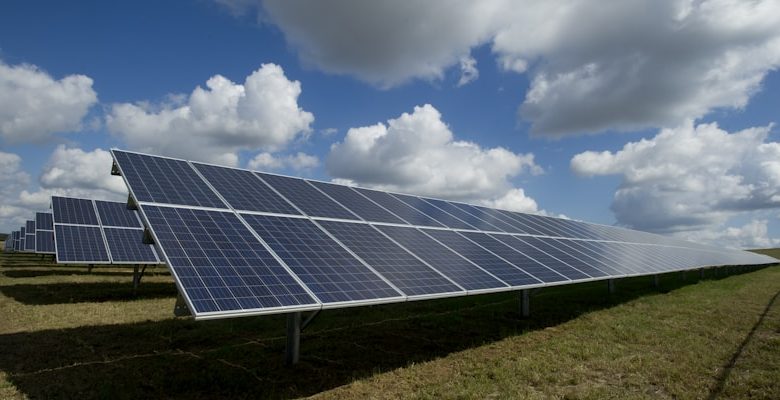Peer-to-Peer Energy Trading with Blockchain

- Understanding Peer-to-Peer Energy Trading
- Exploring the Benefits of Blockchain Technology in Energy Trading
- How Blockchain is Revolutionizing the Energy Industry
- The Future of Energy Trading: Peer-to-Peer Transactions with Blockchain
- Challenges and Opportunities in Peer-to-Peer Energy Trading
- Case Studies: Successful Implementations of Blockchain in Energy Trading
Understanding Peer-to-Peer Energy Trading
Peer-to-peer energy trading is a revolutionary concept that allows individuals to trade excess renewable energy directly with one another. This decentralized system eliminates the need for traditional energy suppliers, enabling participants to buy and sell electricity in a transparent and efficient manner.
By leveraging blockchain technology, peer-to-peer energy trading ensures secure transactions and real-time tracking of energy production and consumption. This innovative approach empowers consumers to take control of their energy usage, promoting sustainability and reducing reliance on centralized power grids.
Participants in peer-to-peer energy trading networks can set their own prices for buying and selling energy, creating a competitive marketplace that benefits both producers and consumers. This peer-driven model fosters community engagement and collaboration, paving the way for a more resilient and environmentally-friendly energy system.
Overall, peer-to-peer energy trading represents a paradigm shift in the way we generate, distribute, and consume electricity. By embracing this decentralized approach, individuals can play a more active role in shaping the future of energy production and contribute to a greener and more sustainable world.
Exploring the Benefits of Blockchain Technology in Energy Trading
Blockchain technology offers numerous benefits when applied to energy trading. One of the key advantages is the increased transparency it provides throughout the trading process. By utilizing blockchain, all transactions are recorded on a decentralized ledger that is immutable and secure. This transparency helps to build trust among participants in the energy trading market.
Another benefit of blockchain technology in energy trading is the efficiency it brings to the process. With traditional energy trading systems, transactions can be slow and costly due to the involvement of intermediaries. Blockchain eliminates the need for intermediaries, allowing for faster and more cost-effective transactions between energy producers and consumers.
Additionally, blockchain technology enables peer-to-peer energy trading, which allows individuals to buy and sell energy directly with one another. This decentralized approach empowers consumers to have more control over their energy usage and costs, while also promoting the use of renewable energy sources.
How Blockchain is Revolutionizing the Energy Industry
Blockchain technology is reshaping the energy industry by enabling peer-to-peer energy trading. This innovative approach allows individuals to buy and sell excess energy directly to one another, bypassing traditional energy providers. By utilizing blockchain technology, participants can securely and transparently track energy transactions in real-time, ensuring trust and efficiency in the trading process.
One of the key benefits of blockchain in energy trading is its ability to decentralize the industry. This means that individuals can become active participants in the energy market by generating their electricity and selling it to others. By cutting out the middleman, consumers can potentially save money on energy costs while also promoting sustainability through the use of renewable energy sources.
Moreover, blockchain technology can help optimize energy distribution by enabling smart contracts. These self-executing contracts automatically trigger transactions when certain conditions are met, streamlining the energy trading process. Additionally, blockchain can provide a secure and tamper-proof record of energy generation and consumption, reducing the risk of fraud and ensuring accurate billing.
Overall, the integration of blockchain technology in the energy industry has the potential to revolutionize how energy is traded and consumed. By promoting decentralization, transparency, and efficiency, blockchain is paving the way for a more sustainable and consumer-centric energy market. As this technology continues to evolve, we can expect to see further advancements in peer-to-peer energy trading and a shift towards a more democratic energy landscape.
The Future of Energy Trading: Peer-to-Peer Transactions with Blockchain
The future of energy trading lies in the innovative technology of blockchain, which enables peer-to-peer transactions without the need for intermediaries. This decentralized approach allows consumers to buy and sell energy directly to one another, creating a more efficient and transparent marketplace. By utilizing blockchain, energy trading can be done securely and efficiently, reducing costs and increasing accessibility.
Challenges and Opportunities in Peer-to-Peer Energy Trading
There are various challenges and opportunities associated with peer-to-peer energy trading that need to be considered. One of the main challenges is the regulatory framework, which can be complex and vary from one region to another. This can create barriers for the implementation of peer-to-peer energy trading platforms. Additionally, the lack of standardization in terms of technical requirements and communication protocols can also pose challenges for interoperability between different systems.
On the other hand, there are significant opportunities for innovation and efficiency in the energy sector through peer-to-peer trading. By enabling consumers to buy and sell energy directly to each other, without the need for traditional intermediaries, peer-to-peer trading can lead to cost savings and increased energy efficiency. It also has the potential to promote the use of renewable energy sources and reduce carbon emissions.
Furthermore, advancements in blockchain technology have made it possible to securely and transparently record energy transactions in a decentralized manner. This can help build trust among participants in peer-to-peer energy trading platforms and ensure the integrity of the data. Smart contracts can also be leveraged to automate transactions and enforce agreements between buyers and sellers.
Case Studies: Successful Implementations of Blockchain in Energy Trading
Several successful implementations of blockchain in energy trading have demonstrated the potential of this technology to revolutionize the industry. These case studies showcase how blockchain can streamline processes, increase transparency, and enable peer-to-peer energy trading.
- One notable example is the project in Brooklyn, New York, where residents were able to buy and sell excess solar energy to their neighbors using a blockchain-based platform. This initiative not only empowered consumers to take control of their energy usage but also reduced reliance on centralized utilities.
- Another successful implementation of blockchain in energy trading took place in Australia, where a virtual microgrid was established to enable renewable energy producers to directly sell their excess electricity to consumers. This system bypassed traditional energy retailers, resulting in lower costs for both producers and consumers.
- In Europe, a pilot project in Germany utilized blockchain technology to enable real-time trading of renewable energy between households. This initiative not only increased the efficiency of energy distribution but also incentivized the adoption of sustainable energy practices.
Overall, these case studies demonstrate the immense potential of blockchain in transforming the energy trading landscape. By enabling peer-to-peer transactions, reducing costs, and promoting sustainability, blockchain is poised to revolutionize the way energy is bought and sold in the future.



